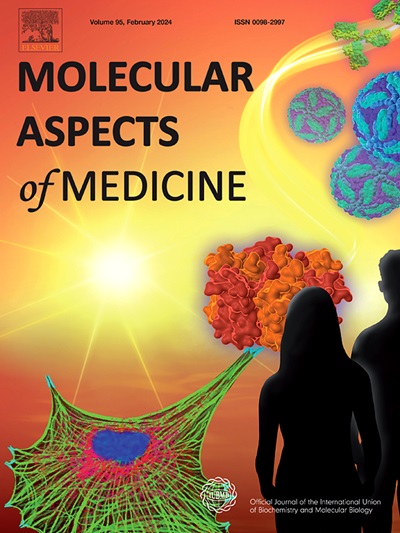糖尿病和胰腺癌之间的双向联系:一种诊断辅助、危险因素和未来治疗的潜在目标
IF 10.3
2区 医学
Q1 BIOCHEMISTRY & MOLECULAR BIOLOGY
引用次数: 0
摘要
历史上,胰腺癌患者表现为高血糖和血糖不耐受,导致糖尿病可能与胰腺导管腺癌(PDAC)相关的假设。近50年后,我们对糖尿病和PDAC之间的关联和病理生理联系的理解继续扩大。已经阐明的是,新发糖尿病,特别是体重减轻或50岁以上的患者,可能是PDAC的早期临床症状。此外,长期糖尿病仍然是PDAC发展的独立危险因素。新发和长期糖尿病和PDAC的病理生理学与非酒精性脂肪性胰腺炎、局部炎症微环境和双向引起和加重糖尿病的代谢改变密切相关。本文综述了目前评价糖尿病和胰腺癌之间关系的证据。我们还回顾了这种相互作用的病理生理学,并讨论了如何理解这些机制可能有助于预防、诊断和治疗胰腺恶性肿瘤。本文章由计算机程序翻译,如有差异,请以英文原文为准。
The bidirectional link between diabetes and pancreatic cancer: A diagnostic aid, risk factor, and potential target for future therapy
Historically, patients with pancreatic cancer presented with hyperglycemia and glycemic intolerance, leading to a hypothesis that diabetes may be associated with pancreatic ductal adenocarcinoma (PDAC). Nearly 50 years later, our understanding about the association and pathophysiological link between diabetes and PDAC continues to expand. What has been elucidated is that new-onset diabetes, especially in patients with weight loss or over the age of 50, may be an early clinical sign of PDAC. Additionally, long-standing diabetes remains an independent risk factor for development of PDAC. The pathophysiology of both new-onset and long-standing diabetes and PDAC is closely linked to non-alcoholic steatopancreatitis, the local inflammatory microenvironment, and metabolic alterations that bidirectionally arise from and worsen diabetes. This review summarizes current evidence evaluating the association between diabetes and pancreatic cancer. We also review the pathophysiology of this interaction, and discuss how understanding these mechanism may allow prevention, diagnosis, and treatment of pancreatic malignancy.
求助全文
通过发布文献求助,成功后即可免费获取论文全文。
去求助
来源期刊

Molecular Aspects of Medicine
医学-生化与分子生物学
CiteScore
18.20
自引率
0.00%
发文量
85
审稿时长
55 days
期刊介绍:
Molecular Aspects of Medicine is a review journal that serves as an official publication of the International Union of Biochemistry and Molecular Biology. It caters to physicians and biomedical scientists and aims to bridge the gap between these two fields. The journal encourages practicing clinical scientists to contribute by providing extended reviews on the molecular aspects of a specific medical field. These articles are written in a way that appeals to both doctors who may struggle with basic science and basic scientists who may have limited awareness of clinical practice issues. The journal covers a wide range of medical topics to showcase the molecular insights gained from basic science and highlight the challenging problems that medicine presents to the scientific community.
 求助内容:
求助内容: 应助结果提醒方式:
应助结果提醒方式:


